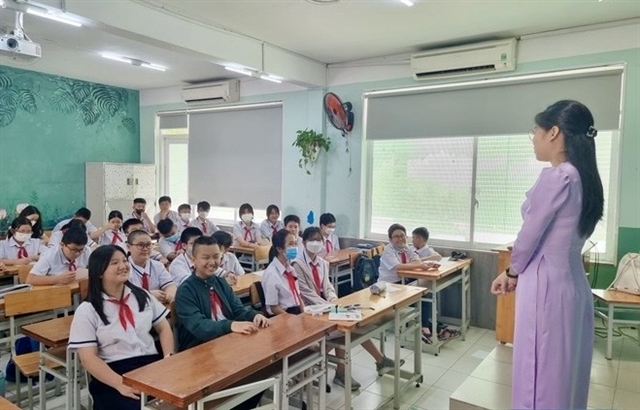 Society
Society

 |
| A junior high school classroom in HCM City. The city plans to build 4,500 new classrooms by 2025. VNA Photo |
HCM CITY — HCM City authorities have announced plans to construct 4,500 new classrooms by 2025 in response to an urgent need for educational facilities.
The project will set a target of 300 classrooms per ten thousand students to ensure sufficient classroom space.
The city currently has a total of 50,650 classrooms, catering to over 1.7 million students and pre-schoolers.
City leaders have said that many middle and primary schools are exceeding the recommended student-to-teacher ratios, impacting the quality of education offered.
There are concerns about the lack of adequate playgrounds, exercise yards, and libraries in schools.
The city had planned to have 300 classrooms per ten thousand students by 2020, but it fell short of its target. The figure was only 294 classrooms as of last August.
An additional 10,000-15,000 students join each grade in the city annually. Given the current population growth rate, an estimated 8,000 new classrooms are required by 2025, according to a report by the Department of Education and Training.
The city is seeking VNĐ32 trillion from the State budget to build nearly 6,000 new classrooms over the next five years.
Private investment
The city plans to call for investment in 110 projects to build 2,300 classrooms worth a total of VNĐ541 trillion under public-private partnership (PPP).
Phan Văn Mãi, chairman of the municipal People’s Committee, said the PPP model would be one of the main solutions for capital mobilisation in the education sector due to limited city funds.
Currently, nearly all education projects are in the Build-Operate-Transfer (BOT) form.
However, the city faces challenges such as land-use planning for PPP projects and a delay in acquiring land, which could increase costs and construction delays for schools and educational facilities.
Another risk is a potential interest rate increase and changes in laws or regulations that could adversely impact the project.
The city will need to address land allocation issues, including relocating and recovering abandoned land, as well as increasing incentives for investing in educational facilities, experts said.
The Government’s policies to encourage PPP investment in education would create enabling conditions for investors and help to develop a healthy and competitive environment for teaching and learning.
However, education usually requires long-term investment and low profit margins, so businesses may need to offset their operating costs in the first few years to maintain quality, experts noted. — VNS